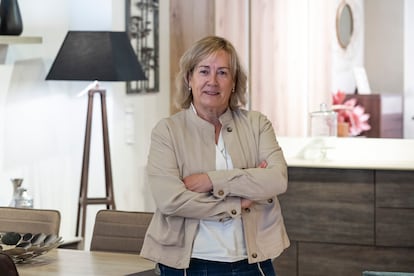The taboo of menopause: ‘You worry you’ll be labeled as old or incapable’
The end of menstruation is still surrounded by social stigma and ignorance, as though it were an obscure disease

If Carla Romagosa had associated those first hot flashes and that eerie tiredness with early menopause —she was diagnosed at the age of 39—her story would have been different.
“The clues and the signs were there. I started having symptoms at 35, but I didn’t associate it with early menopause.”
She visited an assisted reproduction clinic. “There they told me that I had no ovarian reserve. I went to my gynecologist and she confirmed it: I was entering menopause,” she recounts.
The end of menstruation usually happens between the ages of 45 and 55. This implies the cessation of ovarian activity and, subsequently, a decline in the production of female hormones, such as estrogen and progesterone, which influence the regulation of many organic processes.
Menopause, strictly speaking, is a date: the date of the last period. But the process is gradual. In the transitional phase that lasts for several years before and after the last period, endocrinological changes and symptoms occur which can affect a woman’s quality of life.
Hot flashes and insomnia
The most common effects associated with this stage are, according to Dr. Santiago Palacios, spokesperson for the Spanish Society of Gynecology and Obstetrics, “first, menstrual irregularity and vasomotor symptoms, such as hot flashes, sweats or sleep disturbances.” Then, in the medium term, between three and five years after the last period, vaginal dryness, urinary incontinence and other genitourinary symptoms may appear. In the long term, there are other associated ailments, such as osteoporosis.
“In the past, it was believed that hormones were genitals. Today, it is known that there are estrogen receptors in all parts of the body,” Palacios points out.

However, there is no unanimity among the experts when it comes to the symptoms of menopause. Carme Valls, an endocrinologist and the author of Invisible women for science, says that the effects of the cessation of menstruation are limited to hot flashes and vaginal dryness.
“Associating is not the same as causing. The other health problems are those that derive simply from living more than 50 years,” she insists.
A study published in the journal Menopause concludes that the increases in depression, anxiety, urinary incontinence and body mass index among menopausal women are more likely linked to age. On the other hand, motor symptoms, sleep problems, vaginal dryness, sexual pain, decreased sex drive, decreased bone density, or increased body fat are associated with menopause.
There is more consensus to be found when it comes to the idea that no two menopauses are the same: 80% of women going through menopause experience at least one of the symptoms associated with this time of life, but not all aggressively. In fact, the prevalence of moderate or severe vasomotor problems is uncertain: one study indicates that in Europe it was 40%; in the United States, 34%. In Japan, it was reported to be just 16%.
Carla Romagaosa suffered from strong hot flashes, tiredness and difficulty falling asleep. She also experienced anxiety and depression. Due to menopause, she cried a lot, settled in “a roller coaster of perpetual premenstrual cycle.” She became lonely and suffered pain through her body, as she recounts in her memoir, My friend Meno and I.
Romagosa was treated with hormone replacement therapy, which is typically prescribed for cases of early menopause. She wondered why nobody had told her about this condition before.
“Because many people associate it with old age, with something negative… there’s a lack of understanding and communication in society,” she reflects now. She also realizes that there was a lot of ignorance. “I had to surround myself with people who were in the same vital stage as me–50-year-old women–because, when I told my friends, the degree of ignorance they had about this was very high. It was reassuring to get together with women in the same stage and see that nothing strange had happened to me, that this was normal.”
Hot flashes and not sleeping well are normal. Sometimes, in fact, one goes hand-in-hand with the other. You can also gain weight because hormonal imbalances affect fat storage. And this can change the sexual appetite due to the physiological component associated with the drop in hormones, although other factors also contribute, “such as insomnia, fatigue, vaginal dryness and not daring to propose different kinds of sexual relations,” notes Romagosa. But just because it’s normal, it shouldn’t mean you have to suffer in silence.
The weight of stigma
This past June, an editorial in the scientific journal The Lancet warned: “Stigma, embarrassment, a lack of public awareness, and miscommunication mean that for many women, menopause is either borne in quiet suffering or else over-medicalized as nothing more than a hormone deficiency requiring estrogen replacement.”
There is a taboo that comes with menopause. And silence, a lot of silence. “There is shame about menopause and about aging in women. You internalize that shame and you worry about being labeled as old or incapable because of this,” writes Martha Hickey in an email. Dr. Hickey is a gynecologist in the Department of Obstetrics and Gynecology at the Royal Women’s Hospital in Victoria, Australia. She recently wrote an article in the British Medical Journal where she advocates for the normalization of menopause.

Maria Antònia Roca, 63, still remembers how some of her friends balked when she set up the Osteoporosis-Menopause Women’s Association in 2016.
“There is still a lot of stigma and the women who participate appreciate a space where they can speak face-to-face, because they don’t talk [about menopause] at home. There is shame and they stigmatize you: you are menopausal, you can no longer have children, you are old and your youth is gone.”
Manuela H., 49, has just been told that she is already menopausal. She hasn’t had her period for 15 months. For some time, she’s dealt with changes in her sleeping patterns, as well as dry skin and mood swings.
“It’s kind of like an assumption that you’re going down. Not only physically, but also in the state of mind. You are more irritable, with a feeling of sadness… it coincides with a time of life with more changes, because the children are also getting older,” she explains.
Social silence doesn’t help. There are women who don’t even tell their partners, “because of shame, because communication between them has broken down or because they don’t recognize what is happening to them,” Romagosa says.
The spiral of silence is perpetuated between generations, laments Alicia A., 33: “Everything related to women is a taboo. So, you think that all these horrible things only happen to you and that they are a shame when, in reality, it’s all normal.”
Jacqueline Sánchez, 57, was also diagnosed with early menopause at age 34 after internal bleeding from an abortion. While she did tell her husband and her daughter, she admits that, with her mother, “the subject was never discussed.”
From her experience with over 20 years of menopause, the constant lack of information stands out: “You don’t know anything and no matter how much you ask, there isn’t much information either. Now I have insomnia and hot flashes again, for example, probably because I haven’t finished this phase. There’s a lot of ignorance and few explanations, perhaps because it’s [viewed as] unimportant, or because it’s not talked about enough to make it important.”
Information is essential, agrees Aïna Munné, 34. Almost everything she knows about menopause is from her mother.
“I don’t recall any mention in high school of this topic. Like everything that has to do with people with a uterus, it’s made invisible and stigmatized.”
In the UK, they have recently incorporated teaching about menopause into the secondary school curriculum.
Dr. Hickey believes that the role of machismo “is fundamental” in the stigma surrounding menopause. “Menopause is age discrimination based on gender in this society.” And machismo reaches science. “Menopause is a taboo for research. It has not been done well and this is part of the usual ignorance of women’s health.”
Munné is blunt: “We must stop stigmatizing aging and change the way this topic is communicated.” Experts advocate focusing on the positive elements of menopause, such as the end of premenstrual syndromes or the need for contraceptives. Munné also looks at it like this: “I don’t know how I’m going to take it when I get the menopause, but I have endometriosis, so ending painful periods is an attractive proposition,” she resolves.
But experts warn that, as long as silence persists, misinformation and fears will continue to grow. There are women who silently suffer from symptoms that could be treated, Dr. Palacios notes: “One in four women needs hormone replacement therapy and we are only giving it to 2%. That means that 23% are having a hard time.”
The hormone controversy
Hormonal treatment of menopause–which consists of administering hormones that the body has stopped producing–relieves symptoms and, according to the experts consulted, is recommended for women under the age of 60 who are less than 10 years postmenopausal and are facing severe symptoms that impair quality of life.
However, Palacios says that a kind of “hormonophobia” persists in Spain, a generalized rejection of these drugs. The origin of this, according to the doctor, is in the interpretation of a study that was published 20 years ago–the Women’s Health Initiative (WHI)–which associated hormonal therapy with an increased risk of breast cancer.
“We now know that if you start therapy before age 60, the benefits outweigh the risks. If you start later, it’s true that there is a greater risk of venous thrombosis”, adds Palacios.
After the WHI study, the consumption of hormone therapy decreased. But the authors themselves wrote an article in the New England Journal of Medicine where they denounced that their results were being used “inappropriately” to make treatment decisions for women younger than those of the average age of the study (63 years).
But the fear persists and “there is a lot of confusion and fear among the patients,” warns Palacios, who also clarifies that hormonal treatment is simply one more therapeutic option, not the only one. There are vitamin supplements and other approaches for specific symptoms. Exercise and a healthy diet, for example, are essential.
Experts advocate seeking a balance to avoid excessive medicalization, while also responding to the needs of women without downplaying symptoms. A Fawcett Society study reported that one in 10 women has left their job due to menopause.
Tu suscripción se está usando en otro dispositivo
¿Quieres añadir otro usuario a tu suscripción?
Si continúas leyendo en este dispositivo, no se podrá leer en el otro.
FlechaTu suscripción se está usando en otro dispositivo y solo puedes acceder a EL PAÍS desde un dispositivo a la vez.
Si quieres compartir tu cuenta, cambia tu suscripción a la modalidad Premium, así podrás añadir otro usuario. Cada uno accederá con su propia cuenta de email, lo que os permitirá personalizar vuestra experiencia en EL PAÍS.
¿Tienes una suscripción de empresa? Accede aquí para contratar más cuentas.
En el caso de no saber quién está usando tu cuenta, te recomendamos cambiar tu contraseña aquí.
Si decides continuar compartiendo tu cuenta, este mensaje se mostrará en tu dispositivo y en el de la otra persona que está usando tu cuenta de forma indefinida, afectando a tu experiencia de lectura. Puedes consultar aquí los términos y condiciones de la suscripción digital.









































